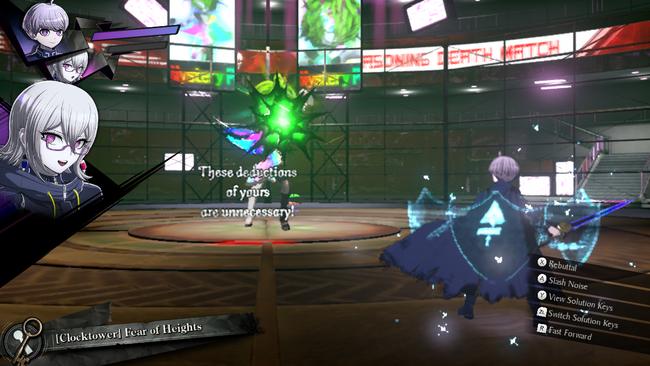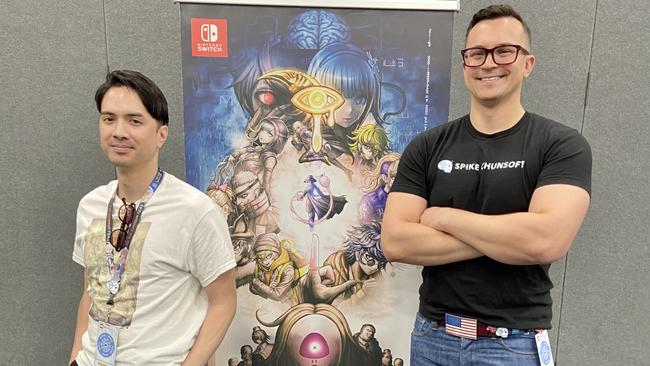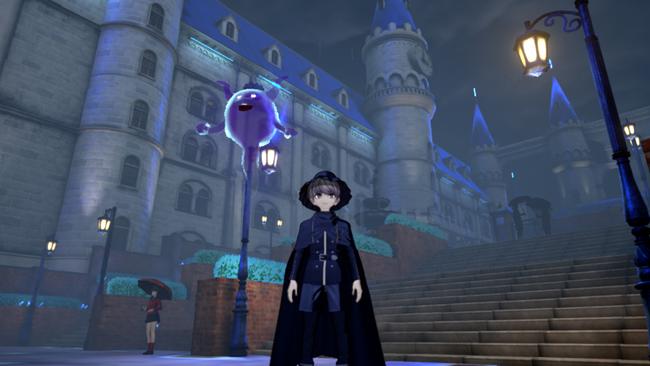
Master Detective Archives: Rain Code Interview - A discussion with Kazutaka Kodaka and the Spike Chunsoft localization team
We recently reviewed Kazutaka Kodaka's latest release, Master Detective Archives: RAIN CODE, and we loved what we ended up playing - to the point when we were offered an interview with Kodaka and the Spike Chunsoft localization team during Anime Expo 2023, we were more than happy to have the chance to chat with them about the project. We had the chance to discuss the game's setting, what makes it unique in Kodaka's works, and more:
RPG Site: It’s been a while since we’ve seen such a major release from you - I believe the last one that most players would remember would be 2017’s Danganronpa V3: Killing Harmony. So, just about 6 years since we’ve seen a major project from you! I’ve been playing Rain Code for the past day or so, and I can definitely tell that a lot of time and effort has been put into not just the presentation - but you can feel the budget that’s gone into the project, too. How was it developing a higher-scale project like this?
Kazutaka Kodaka: Instead of looking out for “completeness”, we strived for a breadth of elements. Because of that, we don’t quite know how users will feel about the game. We’re curious about the reception!

RPG Site: I’m sure you can’t divulge anything specific - but Rain Code is a Switch exclusive, which is interesting after Danganronpa has become available on every platform. PlayStation, Switch, PC, and even Xbox with Game Pass and on mobile. Is there anything you can share about what it was like developing for a single platform like the Switch?
Kodaka: I think I can speak for every creator when I say - it’s really a challenge developing for the Switch. It’s of course important to release our games there, and personally speaking the portability aspect - being able to play it anywhere, like you would read a book in bed - is important for Adventure Games, too.
RPG Site: That reminds me of how originally Danganronpa was a PSP exclusive in Japan, and for a while, the only way to play it in the West was on the PlayStation Vita. In that sense, is Rain Code releasing on Switch an extension of that philosophy?
Kodaka: Despite the difficulties of developing on Switch, it was very important that the game was released on the platform. For companies of our size, who can’t exactly develop “AAA” projects - and of course with the market as it is in Japan - the platform is well suited for the titles we release.

RPG Site: Speaking of release territories - Rain Code is notable for being a worldwide release. Obviously, with Danganronpa, it took quite a while to be localized, and even V3 was a few months' gap. But now Rain Code was a simultaneous release! How did that impact the development process? I guess this can be a question for the localization side too, as every worldwide release comes with its own unique set of challenges.
Kodaka: With Danganronpa, since it was only released in Japan we were able to continue modifying the text all the way up until the master build. Yet with Rain Code, since we had to account for the localization - and fully-voiced! - once recordings started, we were done, we couldn’t make any last-minute changes. In a way, it was easier on our end! Though we did put a lot of references to Japanese culture, so we worried how those might have made the transition to different languages.
RPG Site: I think I know one of those references you’re talking about, and I did appreciate that Dragon Quest parody; “I know a spell that can get us somewhere really fast!”
Alex Flagg: For Rain Code, one of the biggest challenges it wasn’t just the English localization, but also the FIGS localization - since any of the changes on the Japanese side wouldn’t just have to be brought over to Daniel and edited on the English side, but then filtered down through the FIGS builds to ensure every translation accounted for the same text. That created a difficult workflow, and we had to crunch a lot to ensure everything was updated properly.
Daniel Le: It was certainly a unique challenge. Getting everyone on the same level, constantly; it made a lot of sense to me too, Kodaka’s vision is that this was a worldwide game - Kanai Ward itself is a mingling of people from the entire world. We put a lot of effort, into working with the FIGS team and the voice actors themselves to make sure that each of the characters had a “voice” that really reflected it, the different communities you’d see around the world. Very challenging, but at the same time it was a lot of fun. Getting all the Dragon Quest references was indeed especially tough, and we had to give FIGS the heads-up every time we found one…

RPG Site: I think it’s fair to say that there are a lot of similarities between Rain Code and your previous works in Rain Code. How challenging was it to balance between the elements of the game that would appeal to fans of your previous works, and the new aspects of it? Danganronpa wasn’t really an RPG, but Rain Code has all of these sidequests and these side characters - put another way, Kanai Ward is isolated from the rest of the world, but unlike in Danganronpa, you aren’t isolated from society.
Kodaka: We wanted to create something new and challenging, something that wasn’t a continuation of Danganronpa; a game where users can have the excitement of mystery games while also incorporating aspects of RPGs such as exploring the world and then making use of what you found and bringing that into the Mystery Labyrinths. Since this is a new IP, we didn’t really think about how Danganronpa fans felt about it, but rather how many users might enjoy a new Mystery game.
RPG Site: One thing I’ve noticed about your works is how the setting itself feels like a character, and how they can influence the tone of the game. Kanai Ward is very striking in how different it feels compared to the settings of your past titles. Whether it’s down to the fact that it’s a really vibrant and detailed city - especially for the Switch. For example, I remember going into a random cafe, and if you squinted hard enough you could see that there were some coffee cups in the sink with coffee stains on the bottom of the glass! It’s a very different sort of setting from what I’m used to seeing from your games; so where did the idea for Kanai Ward come from?
Kodaka: When we were developing Danganronpa, there actually wasn’t anyone in charge of the scenes. So that meant that the story was developed first, and then the backgrounds and scenes were created after the fact, and I’d have to describe the details as they were being designed. However, for Rain Code, the background and scene designs were created by one of the illustrators, Shimadoriru. When I created the scenario it was a collaborative effort where Komatsuzaki-san and the Shimadoriru would have discussions about how the story works. So unlike with Danganronpa, it was all happening at the same time. As a result, the setting feels like it’s much more in line with the vision we had for the story.
RPG Site: Thanks again for your time - as well as Alex and Daniel from Spike Chunsoft, of course. We hope you have a great rest of the expo!